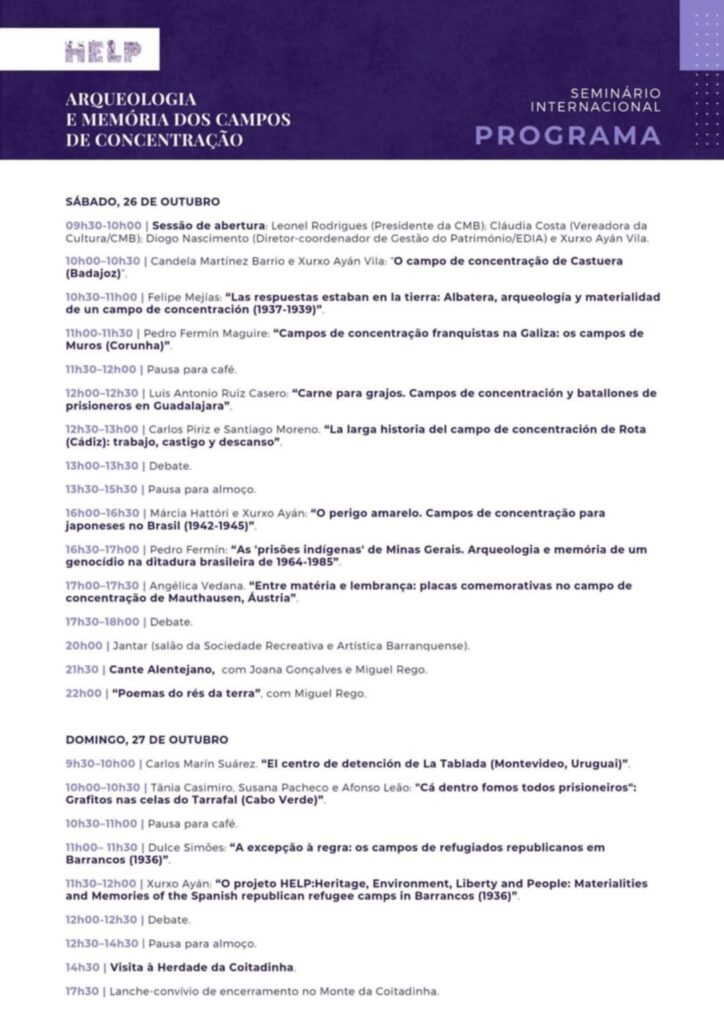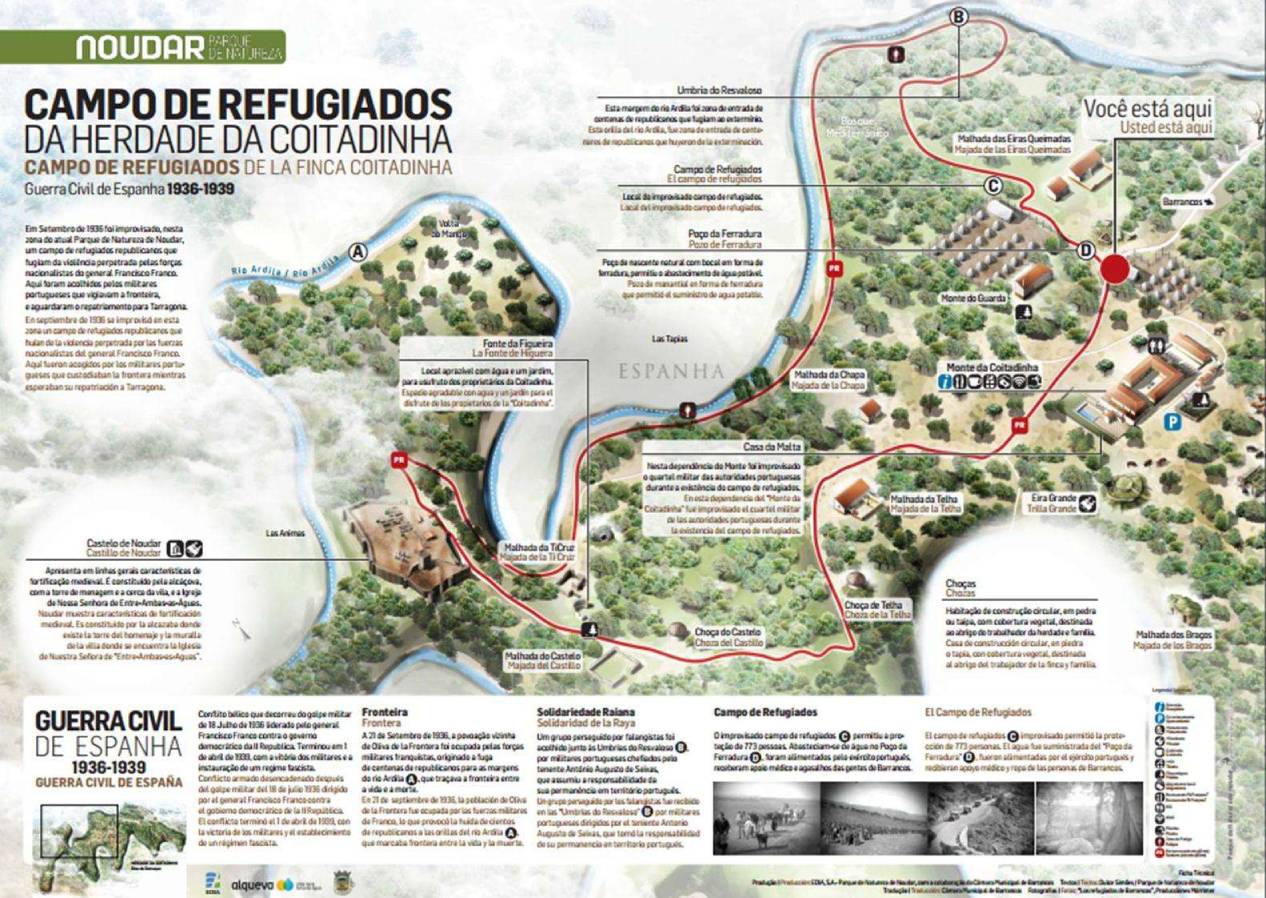Lab2PT — Conferences — Seminars
Seminars
International Seminar of the HELP Exploratory Project "Archaeology and Memory of Concentration Camps"

Sharing experiences and inspiring the archaeological intervention that will be carried out in the first half of 2025 within the scope of the HELP project are the objectives of the International Seminar “Arqueology and Memory of Concentration Camps”, which takes place in Barrancos, Alentejo, on the 26th and 27th of October , bringing together renowned experts on the subject of concentration camp archeology, from Brazil, Portugal, Spain and Uruguay.
Aimed not only at specialists and the local community but at all interested parties, the seminar takes place at the Barranquenho Interpretive Center (Rua Dona Maria das Dores Fialho Garcia, 4, 7230-010 Barrancos, Portugal, https://maps.app.goo.gl/8UX7u1qpQs5uLhGcA ), with dinner on Saturday at Sociedade Recreativa Artística Barranquense, with Alentejo singing and poetry.
On Sunday afternoon, participants will visit Fazenda Coitadinha and there will be a social snack. One of the two refugee camps in Barrancos studied by the project “HELP – Heritage, Environment, Liberty and People. Archeology of the Spanish refugee camps in Barrancos, Alentejo (1936)” was improvised at Herdade da Coitadinha – the other being As Russianas.
The opening session of the two-day international seminar is led by Leonel Rodrigues, president of the Barrancos City Council (CMB), Cláudia Costa, CMB Culture councilor, Diogo Nascimento, coordinating director of EDIA – Empresa de Desenvolvimento e Infra – Alqueva structures responsible for Heritage Management, and Xurxo Ayán Vila (IHC – NOVA FCSH / IN2PAST), researcher responsible for HELP.
Among the speakers are, in addition to Xurxo Ayán and the researcher co-responsible for the project Dulce Simões (INET-md – NOVA FCSH), in alphabetical order:
• Angélica Vedana, researcher at CRIA – NOVA FCSH / IN2PAST.
• Candela Martínez Barrio, archaeologist at the Cabildo of Gran Canaria [a type of Insular Council], Spain; he directed several exhumations of victims of Francoism, including in the Castuera concentration camp (Badajoz, Spain).
• Carlos Piriz, historian, associate professor of Contemporary History at the University of Cádiz, Spain.
• Felipe Mejía, director of the archaeological project at the Albatera concentration camp (Alicante, Spain).
• Luis Antonio Ruiz Casero, historian, researcher at the Grupo de Investigación Complutense de la Guerra Civil y el Franquismo, Universidad Complutense de Madrid, Spain.
• Márcia Hattóri, archaeologist, researcher at the Instituto de Ciencias del Patrimonio of the Consejo Superior de Investigaciones Científicas, Spain.
• Pedro Fermín Maguire, archaeologist, Federal University of Minas Gerais (Brazil).
• Tânia Casimiro, professor of Archeology at NOVA FCSH, researcher at HTC – NOVA FCSH
Entry is free, subject to the capacity of the space (one hundred people).
Information about the Project “HELP. Heritage, Environment, Liberty and People. Archeology of the Spanish refugee camps in Barrancos, Alentejo (1936)”
Organization: Xurxo Ayán Vila (IHC – NOVA FCSH / IN2PAST), responsible researcher (IR) of the HELP project and Dulce Simões (INET-md – NOVA FCSH), co-responsible researcher (co-IR) of the HELP project
Collaborating entities: Municipal Council of Barrancos, Municipal Museum of Archeology and Ethnography of Barrancos, EDIA – Alqueva Development and Infrastructure Company, Noudar Nature Park
Project HELP on the Web: https://in2past.org/exploratory-projects-help/
Five major objectives of the project HELP, in the words of RI:
1. Get closer to the materiality of the republican refugee camps of 1936, in Barrancos (Portugal/ Baixo Alentejo), in order to reconstruct the daily life and living conditions of their occupants, based on the crossing of archaeological documentation with oral testimonies and archival documents.
2. Carry out an exhaustive archaeological study of this border landscape, to reconstruct its evolution throughout the historical process, considering that, currently, an approach centered on ecology and the environment prevails, in line with its promotion as a natural park. It is the team’s intention to prepare a rigorous report, which restores its status as a “place of memory”.
3. Meet the collective imagination of local communities, to analyze the memory preserved among the new generations (Portuguese and Spanish), based on the integration of populations in the research process itself, and the participation of citizens.
4. Intending to contribute to the local and sustainable development of this depressed rural area of Bahia, the HELP project will serve as the basis for new models of promoting the region, such as “memory tourism”. Linking the traumatic past to the present, at a time marked by new flows of refugees and the rise of neo-fascism.
5. The HELP project has a clear didactic vocation, as an instrument for promoting Human Rights and Education for Peace, as it aims to recover the values of solidarity and cross-border hospitality that are so necessary for the future.

26 and 27 of October 2024
Centro Interpretativo do Barranquenho, Barrancos
Xurxo Ayan Vila (Researcher in charge) | IHC/NOVA FCSH/IN2PAST Dulce Simões (Co-responsible researcher) | Institute of Ethnomusicology - Center for Music and Dance Studies – NOVA FCSH Support from Barrancos City Council, Municipal Museum of Archeology and Ethnography of Barrancos and EDIA - Empresa de Desenvolvimento e Infra-estruturas do Alqueva, S.A. / Noudar Natural Park